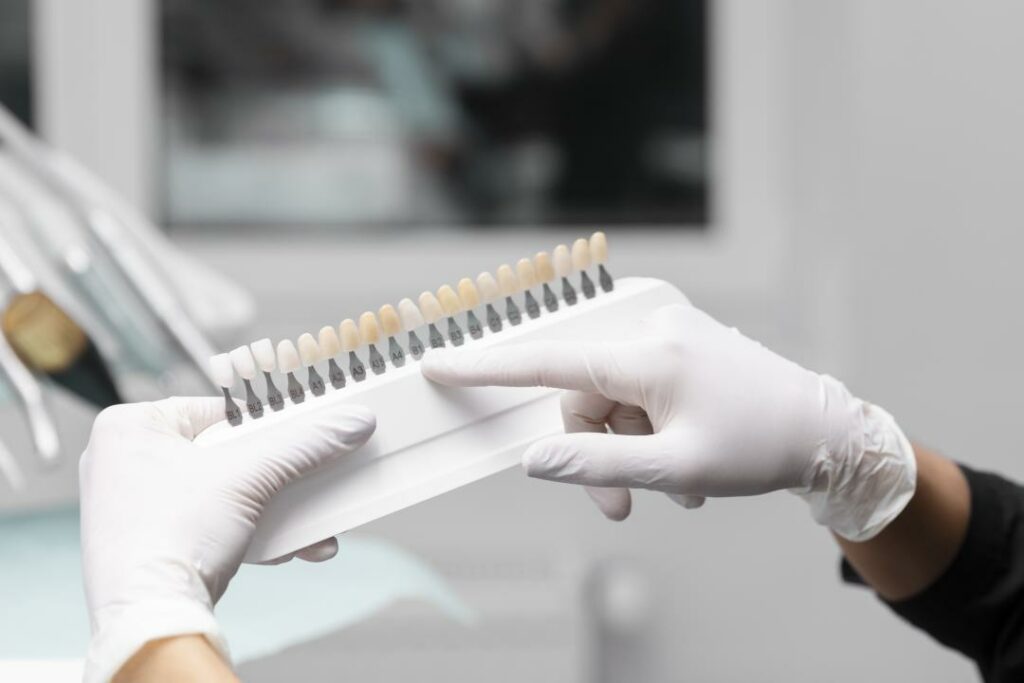Table of Contents

Discover the truth about remove all your teeth and get implants. Learn about the benefits, risks, and costs of dental implant surgery. Discover how Synergy Health Travel can help you save money while receiving high-quality dental care in Turkey.
Dental implants are prosthetic tooth roots that are inserted into the jawbone after surgery to support replacement teeth. Dental implants have many benefits over dentures, including better speech, comfort, and function as well as a more aesthetically pleasing and long-lasting replacement for lost teeth.
Many steps are normally included in the dental implant surgery, including consultation, examination, implant preparation and placement, and connection of the replacement teeth. A knowledgeable dental staff must carefully plan and carry out each step to guarantee the best results and reduce dangers.
In recent years, health tourism has grown in popularity as a solution for people looking for low-cost, top-notch dental care abroad. Turkey has been a prominent location for dental tourism thanks to its top-notch facilities, skilled practitioners, and affordable prices. We shall delve more into the subject of dental implants and medical travel in Turkey in this article.
Can You Remove All Your Teeth and Get Implants?
Yes, it is possible to have all of your teeth removed and replaced with dental implants. Whole mouth dental rehabilitation or full mouth dental implant restoration are two terms used to describe this operation.
Whole teeth extraction, also known as a full mouth extraction, is getting rid of every tooth a patient has, whether it’s because of serious decay, gum disease, or other dental issues. While this can sound excessive, it can really have a positive impact on some patients’ oral health, function, and appearance.
All of the teeth in the upper, lower, or both jaws can be replaced with dental implants, which can be a great alternative. Dental implants are not appropriate for everyone, though. The success of dental implant surgery can be impacted by elements like age, general health, and the state of the jawbone and surrounding tissues.
Your dentist will perform a thorough examination, which may include a dental exam, X-rays, and maybe a CT scan, to ascertain whether dental implants are the best option for you. Before doing implant surgery, they will evaluate the quantity and quality of the jawbone and see if there are any dental problems that need to be fixed beforehand.
Smoking, diabetes, radiation therapy, and some medications are factors that could have an impact on the outcome of dental implant surgery. When determining whether you are a candidate for dental implants, your dentist will also take into account your oral hygiene routines and lifestyle choices including food and exercise.

The Dental Implant Procedure
The dental implant procedure typically involves the following steps:
- Consultation and Evaluation:
Your dentist will conduct a thorough examination of your teeth and gums and take X-rays to assess the condition of your jawbone. They will also discuss your medical history and any medications you are taking to determine if dental implants are a viable option for you. - Implant Placement:
The first step in the implant placement process involves the surgical insertion of the implant into the jawbone. The implant serves as a replacement for the natural tooth root and is made of biocompatible materials such as titanium or zirconia. The implant is left to heal for several months, during which time it fuses with the jawbone, creating a sturdy foundation for the replacement tooth. - Abutment Placement:
After the implant has fused with the jawbone, the abutment, which connects the implant to the replacement tooth, is placed on top of the implant. - Replacement Tooth Placement:
The final step involves placing the replacement tooth, which can be a crown, bridge, or denture, onto the abutment. The replacement tooth is custom-designed to match the size, shape, and color of your natural teeth.
Dental implants come in a variety of forms, such as endosteal implants that are inserted directly into the jawbone and subperiosteal implants that are positioned on top of the jawbone but beneath the gum line. Although there are many different materials that can be used for dental implants, titanium is the most popular choice because of its strength and biocompatibility.
Depending on the patient’s requirements and choices, dental implant surgery may be carried out under local anaesthetic, sedation, or general anaesthesia. Oral sedation, nitrous oxide, or IV sedation are sedative options that may assist to lessen anxiety and discomfort during the treatment.
Preparing for Dental Implant Surgery
Preparing for dental implant surgery involves several important steps to ensure optimal outcomes and minimize the risk of complications. These steps may include:
- Consultation with a Dentist:
Before undergoing implant surgery, it’s important to schedule a consultation with a qualified dentist. During the consultation, your dentist will conduct a thorough examination of your teeth and gums, take X-rays and possibly a CT scan, and discuss your medical history and any medications you are taking. They will also evaluate your jawbone to determine if it is strong and healthy enough to support dental implants. - Required Dental Treatments:
Depending on the condition of your teeth and gums, you may need to undergo certain dental treatments before implant surgery. For example, if you have gum disease or tooth decay, these issues will need to be addressed before implants can be placed. Your dentist may also recommend bone grafting or other procedures to strengthen the jawbone and prepare it for implant surgery. - Preparing for the Day of Surgery:
On the day of surgery, you will need to follow specific instructions from your dentist. You may need to avoid eating or drinking for a certain amount of time before the procedure, and you will need to arrange for transportation to and from the dental office, as sedation or anesthesia may be involved. - Aftercare:
After implant surgery, you will need to take good care of your mouth to promote healing and reduce the risk of infection. Your dentist will provide specific instructions on how to care for your implants, such as avoiding hard or crunchy foods and practicing good oral hygiene habits.
By taking these steps to prepare for implant surgery, you can increase the chances of a successful outcome and enjoy the many benefits of dental implants.
Aftercare and Recovery
Aftercare and recovery are critical aspects of the dental implant process to ensure proper healing and long-term success. The following are some important considerations for aftercare and recovery:
- Post-Surgical Care Instructions:
After implant surgery, your dentist will provide specific instructions for post-surgical care. This may include avoiding certain foods and activities, taking pain medication as prescribed, and using ice packs to reduce swelling. - Tips for a Speedy Recovery:
To promote healing and a speedy recovery, it’s important to rest and avoid strenuous activities for the first few days after surgery. You may also need to rinse your mouth with a special mouthwash or saltwater solution to reduce the risk of infection. - Possible Side Effects and Complications:
Like any surgical procedure, dental implant surgery can result in side effects and complications. These may include pain, swelling, bleeding, infection, and implant failure. Your dentist will monitor your progress closely and provide guidance on how to manage these issues if they arise. - Long-Term Care and Maintenance:
After your implants have fully healed, it’s important to maintain good oral hygiene habits to keep them healthy and functional. This may include brushing and flossing regularly, using an antibacterial mouthwash, and visiting your dentist for regular check-ups and cleanings.
By following these aftercare and recovery guidelines, you can minimize the risk of complications and ensure the long-term success of your dental implants.

The Benefits of Dental Tourism in Turkey
Dental tourism has become increasingly popular in recent years, with many people seeking high-quality dental care at a more affordable price. Turkey has emerged as one of the top destinations for dental tourism, offering a range of benefits, including:
- Cost Savings Compared to Other Countries:
Dental care in Turkey is significantly more affordable than in many other countries, including the United States and Western Europe. This makes it an attractive option for people who are seeking high-quality care at a lower cost. - Quality of Dental Care in Turkey:
Turkey is known for its high standards of dental care, with many dentists and clinics offering the latest technologies and techniques. Many Turkish dentists are trained in Europe or the United States and are members of international dental organizations, ensuring that they adhere to the highest standards of quality and safety. - Additional Benefits of Traveling to Turkey for Dental Care:
In addition to the cost savings and high-quality care, traveling to Turkey for dental care offers several other benefits. For example, many dental clinics in Turkey offer comprehensive packages that include transportation, accommodations, and sightseeing tours. This allows patients to enjoy a relaxing and enjoyable vacation while receiving top-notch dental care.
By choosing to travel to Turkey for dental care, patients can enjoy significant cost savings without compromising on quality or safety. With its beautiful scenery, rich history, and welcoming culture, Turkey offers a unique and unforgettable experience for dental tourists.
Synergy Health Travel: Your Guide to Dental Tourism in Turkey
Synergy Health Travel is an international health travel agency based in Izmir, Turkey, specializing in dental tourism. They offer a range of services to help patients from around the world access high-quality dental care in Turkey, including:
- Introduction to Synergy Health Travel and Their Services:
Synergy Health Travel offers a comprehensive range of services to help patients plan and arrange their dental tourism trip to Turkey. This includes assistance with travel arrangements, booking appointments with top-rated dental clinics, and providing translation services. - Advantages of Using a Health Travel Agency for Dental Tourism:
Using a health travel agency like Synergy Health Travel offers several advantages for dental tourists. These include access to discounted rates for dental treatments, personalized attention and support throughout the trip, and assistance with navigating local customs and regulations. - Synergy Health Travel’s Partnership with Top-Rated Dental Clinics in Turkey:
Synergy Health Travel has established partnerships with some of the top-rated dental clinics in Turkey, ensuring that patients receive the highest standard of care. These clinics offer a range of services, including dental implants, veneers, teeth whitening, and more.
By working with Synergy Health Travel, patients can enjoy a stress-free and streamlined dental tourism experience, with access to top-rated clinics and personalized support every step of the way.
Frequently Asked Questions
- Who is a Good Candidate for Dental Implants?
A good candidate for dental implants is someone who has healthy gums and sufficient bone density to support the implant. Candidates should also have good oral hygiene habits and be committed to maintaining their dental health long-term. - How Long Does the Dental Implant Process Take?
The dental implant process typically takes several months, as it involves multiple stages. The initial consultation and planning stage can take several weeks, while the actual implant surgery usually takes a few hours. The implant must then integrate with the jawbone, which can take several months. Finally, the permanent crown or bridge is placed on top of the implant. - What is the Cost of Dental Implants in Turkey?
The cost of dental implants in Turkey is significantly lower than in many other countries, such as the United States or United Kingdom. The exact cost will depend on the number of implants needed, the type of implant used, and the complexity of the surgery. - What are the Risks of Dental Implant Surgery?
Like any surgical procedure, dental implant surgery carries some risks, such as infection, bleeding, or nerve damage. However, these risks are relatively low, and most patients experience a smooth and successful recovery. It’s important to work with a qualified and experienced dentist to minimize the risk of complications.
In conclusion, dental implants are a great choice for people looking for a long-lasting and realistic replacement for lost teeth. The process is multi-staged, necessitates careful planning and aftercare, but the outcomes have the potential to be life-altering. For those in need of dental care, dental tourism in Turkey is an affordable and high-quality alternative, with Synergy Health Travel offering individualised support and guidance throughout the process.
We strongly advise consulting with a licenced and competent dentist and thinking about the advantages of dental tourism in Turkey if you’re thinking about getting dental implants. To learn more and to make travel arrangements, get in touch with Synergy Health Travel immediately.
Feel free to contact us 🙂
Follow us on Instagram: Synergy Global




